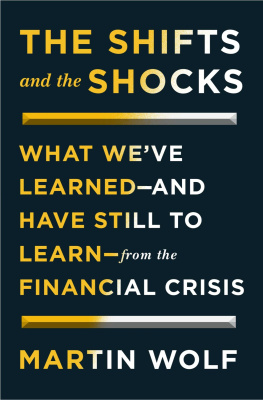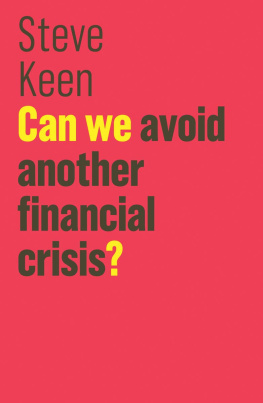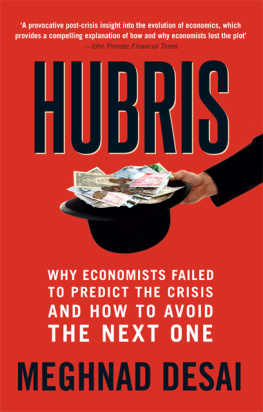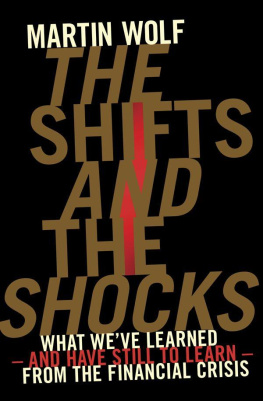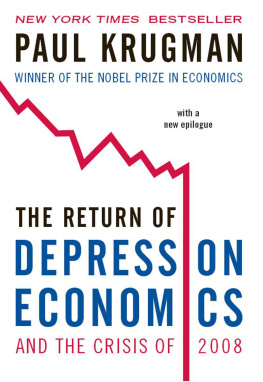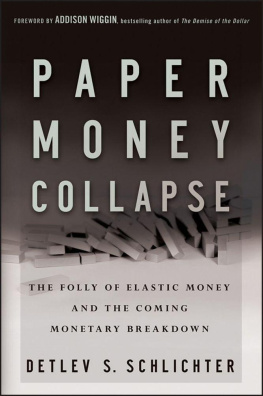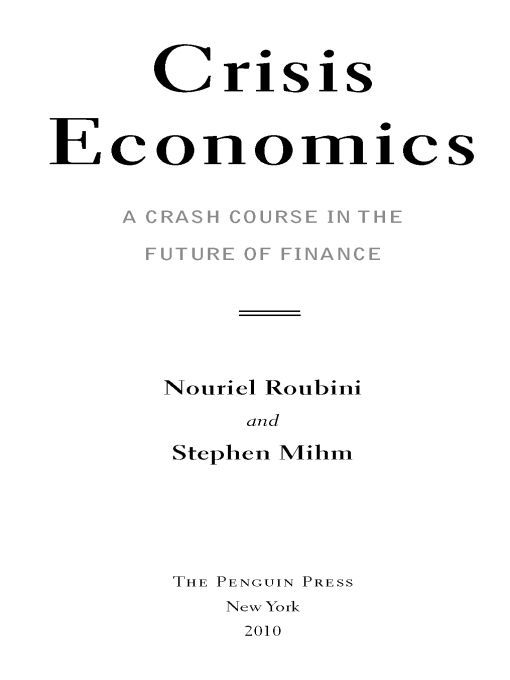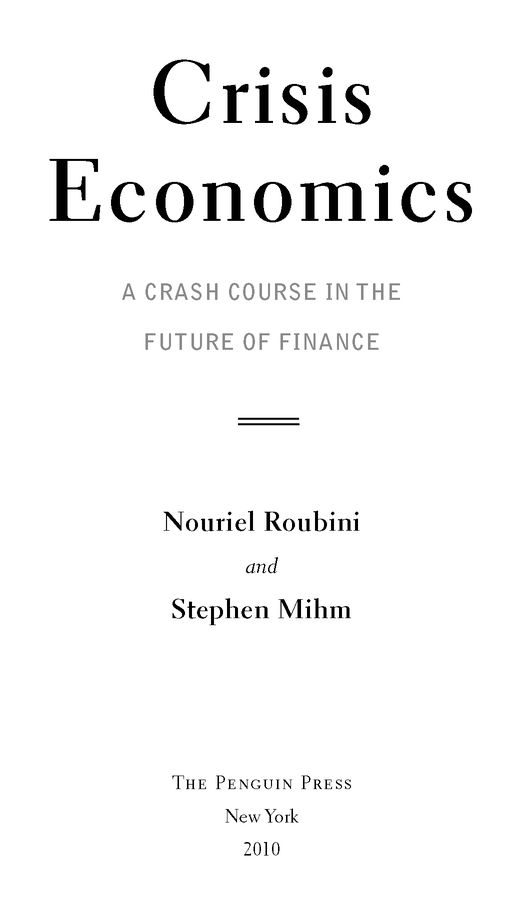Table of Contents
ALSO BY NOURIEL ROUBINI
New International Financial Architecture (with Marc Uzan)
Bailouts or Bail-Ins? Responding to Financial Crisis in Emerging Economies (with Brad Setser)
Political Cycles and the Macroeconomy
(with Alberto Alesina and Gerald D. Cohen)
ALSO BY STEPHEN MIHM
A Nation of Counterfeiters: Capitalists, Con Men, and the Making of the United States
Artificial Parts, Practical Lives: Modern Histories of Prosthetics (editor, with Katherine Ott and David Serlin)
Nouriel Roubini: To H.H., K.S., L.S., M.M., and M.W.
Stephen Mihm: To my family
Introduction
In January 2009, in the final days of the Bush administration, Vice President Dick Cheney sat down for an interview with the Associated Press. He was asked why the administration had failed to foresee the biggest financial crisis since the Great Depression. Cheneys response was revealing. Nobody anywhere was smart enough to figure [it] out, he declared. I dont think anybody saw it coming.
Cheney was hardly alone in his assessment. Look back at the statements that the wise men of the financial community and the political establishment made in the wake of the crisis. Invariably, they offered some version of the same rhetorical question: Who could have known? The financial crisis was, as Cheney suggested in this same interview, akin to the attacks of September 11: catastrophic, but next to impossible to foresee.
That is not true. To take but the most famous prediction made in advance of this crisis, one of the authors of the bookNouriel Roubiniissued a very clear warning at a mainstream venue in the halcyon days of 2006. On September 7, Roubini, a professor of economics at New York University, addressed a skeptical audience at the International Monetary Fund in Washington, D.C. He forcefully sounded a warning that struck many in the audience as absurd. The nations economy, he predicted, would soon suffer a once-in-a-lifetime housing bust, a brutal oil shock, sharply declining consumer confidence, and inevitably a deep recession.
Those disasters were bad enough, but Roubini offered up an even more terrifying scenario. As homeowners defaulted on their mortgages, the entire global financial system would shudder to a halt as trillions of dollars worth of mortgage-backed securities started to unravel. This yet-to-materialize housing bust, he concluded, could lead... to a systemic problem for the financial system, triggering a crisis that could cripple or even take down hedge funds and investment banks, as well as government-sponsored financial behemoths like Fannie Mae and Freddie Mac. His concerns were greeted with serious skepticism by the audience.
Over the next year and a half, as Roubinis predictions started coming true, he elaborated on his pessimistic vision. In early 2008 most economists maintained that the United States was merely suffering from a liquidity crunch, but Roubini forecast that a much more severe credit crisis would hit households, corporations, and most dramatically, financial firms. In fact, well before the collapse of Bear Stearns, Roubini predicted that two major broker dealers (that is, investment banks) would go bust and that the other major firms would cease to be independent entities. Wall Street as we know it, he warned, would soon vanish, triggering upheaval on a scale not seen since the 1930s. Within months Bear was a distant memory and Lehman Brothers had collapsed. Bank of America absorbed Merrill Lynch, and Morgan Stanley and Goldman Sachs were eventually forced to submit to greater regulatory oversight, becoming bank holding companies.
Roubini was also far ahead of the curve in spotting the global dimensions of the disaster. As market watchers stated confidently that the rest of the world would escape the crisis in the United States, he correctly warned that the disease would soon spread overseas, turning a national economic illness into a global financial pandemic. He also predicted that this hypothetical systemic crisis would spark the worst global recession in decades, hammering the economies of China, India, and other nations thought to be impervious to troubles in the United States. And while other economists were focused on the danger of inflation, Roubini accurately predicted early on that the entire global economy would teeter on the edge of a potentially crippling deflationary spiral, of a sort not seen since the Great Depression.
Roubinis prescience was as singular as it was remarkable: no other economist in the world foresaw the recent crisis with nearly the same level of clarity and specificity. That said, he was not alone in sounding the alarm; a host of other well-placed observers predicted various elements of the financial crisis, and their insights helped Roubini connect the dots and lay out a vision that incorporated their prescient insights. Roubinis former colleague at Yale University, Robert Shiller, was far ahead of almost everyone in warning of the dangers of a stock market bubble in advance of the tech bust; more recently, he was one of the first economists to sound the alarm about the housing bubble.
Shiller was but one of the economists and market watchers whose views influenced Roubini. In 2005 University of Chicago finance professor Raghuram Rajan told a crowd of high-profile economists and policy makers in Jackson Hole, Wyoming, that the ways bankers and traders were being compensated would encourage them to take on too much risk and leverage, making the global financial system vulnerable to a severe crisis. Other well-respected figures raised a similar warning: Wall Street legend James Grant warned in 2005 that the Federal Reserve had helped create one of the greatest of all credit bubbles in the history of finance; William White, chief economist at the Bank for International Settlements, warned about the systemic risks of asset and credit bubbles; financial analyst Nassim Nicholas Taleb cautioned that financial markets were woefully unprepared to handle fat tail events that fell outside the usual distribution of risk; economists Maurice Obstfeld and Kenneth Rogoff warned about the unsustainability of current account deficits in the United States; and Stephen Roach of Morgan Stanley and David Rosenberg of Merrill Lynch long ago raised concerns about consumers in the United States living far beyond their means.
The list goes on. But for all their respectability, these and other economists and commentators were ignored, a fact that speaks volumes about the state of economics and finance over recent decades. Most people who inhabited those worlds ignored those warnings because they clung to a simple, quaint belief: that markets are self-regulating entities that are stable, solid, and dependable. By this reasoning, the entire edifice of twenty-first-century capitalismaided, of course, by newfangled financial innovationwould regulate itself, keeping close to a steady, self-adjusting state of equilibrium.
It all seems nave in retrospect, but for decades it was the conventional wisdom, the basis of momentous policy decisions and the rationale for grand-scale investment strategies. In this paradigm, not surprisingly, economic crises had little or no significant place. Indeed, if crises appeared at all, they were freak events: highly improbable, extremely unusual, largely unpredictable, and fleeting in their consequences. To the extent that crises became the object of serious academic study, they were generally considered to afflict less developed, troubled countries, not economic powerhouses like the United States.


